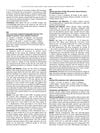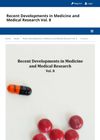 January 2011 in “Medicina interna de México”
January 2011 in “Medicina interna de México” The document concludes that treating the underlying causes of telogen effluvium usually results in hair regrowth.
 January 2003 in “Postgraduate medicine”
January 2003 in “Postgraduate medicine” The article concludes that hair loss has many causes and treatments, with medication options like finasteride and minoxidil for men, and minoxidil, hormones, or iron for women, while warning against unproven remedies.
 7 citations,
March 2016 in “Journal of Cosmetic and Laser Therapy”
7 citations,
March 2016 in “Journal of Cosmetic and Laser Therapy” Home-use lasers and IPL devices are unlikely to directly cause paradoxical hair growth; it may be linked to inflammation or hormonal issues.
 January 2017 in “Journal of cosmetology & trichology”
January 2017 in “Journal of cosmetology & trichology” A man with severe hair loss regrew hair after hormone treatment.
 August 2024 in “EMJ Dermatology”
August 2024 in “EMJ Dermatology” Non-scarring alopecia in females affects emotional well-being and requires accurate diagnosis and personalized treatment.
 October 2021 in “Cosmoderma”
October 2021 in “Cosmoderma” Hair loss can be managed with treatments like minoxidil, finasteride, and others, but there are still gaps in effectiveness and off-label usage is increasing.
 February 2024 in “medRxiv (Cold Spring Harbor Laboratory)”
February 2024 in “medRxiv (Cold Spring Harbor Laboratory)” The study aims to understand how mood, physical activity, light exposure, and seasonal changes affect sleep patterns.
December 2020 in “Journal of Skin and Sexually Transmitted Diseases” No strong link between testosterone or DHEAS levels and acne or hair loss in females.
 2 citations,
September 2022 in “Indian Journal of Dermatology, Venereology and Leprology”
2 citations,
September 2022 in “Indian Journal of Dermatology, Venereology and Leprology” The transgender community in India has specific skin care needs and struggles to access dermatological services due to discrimination and financial issues.
 7 citations,
February 2018 in “Australian Prescriber”
7 citations,
February 2018 in “Australian Prescriber” Some sports supplements can cause health issues like mood swings, hair loss, and heart problems in men.
 6 citations,
February 1974 in “The BMJ”
6 citations,
February 1974 in “The BMJ” The document concludes that scalp disorders can be treated with hair washing, specific shampoos, medications, and sometimes surgery or hair transplants, but hereditary baldness is untreatable.
 May 2024 in “International Journal of Advanced Academic Studies”
May 2024 in “International Journal of Advanced Academic Studies” Vitamin E helps reduce PCOS symptoms and improves hormonal balance.
 March 2024 in “CRC Press eBooks”
March 2024 in “CRC Press eBooks” Nutraceuticals can effectively manage hormonal imbalances and related health issues.

Different genes cause Female Pattern Hair Loss compared to male hair loss, and treatments vary, but more research is needed to understand it fully.
 11 citations,
April 2018 in “Nutrition Research”
11 citations,
April 2018 in “Nutrition Research” Chromium supplements don't help with weight loss or improve hormone and metabolism issues in people with polycystic ovary syndrome.
September 2017 in “Springer eBooks” Certain supplements, like whey protein isolate and growth hormones, can worsen hair loss.
 April 2024 in “Remedium Journal about the Russian market of medicines and medical equipment”
April 2024 in “Remedium Journal about the Russian market of medicines and medical equipment” Pharmacy workers need more education to better help people with hair loss.
 December 2024 in “Archiv Euromedica”
December 2024 in “Archiv Euromedica” Early diagnosis and personalized treatment are crucial for managing PCOS and preventing complications.
 8 citations,
January 2020 in “Skin appendage disorders”
8 citations,
January 2020 in “Skin appendage disorders” Saw palmetto supplements may modestly improve hair regrowth with few side effects, but more research is needed.
 September 2009 in “European Urology Supplements”
September 2009 in “European Urology Supplements” Surgery for high-risk prostate cancer is challenging but doesn't lead to more complications, and additional treatment is often needed.
Treating hair loss in PCOS involves a combination of lifestyle changes, medication, and possibly hair care strategies.

Women with Polycystic Ovary Syndrome (PCOS) have a higher risk of developing type 2 diabetes due to insulin resistance.
 October 2021 in “Book Publisher International (a part of SCIENCEDOMAIN International)”
October 2021 in “Book Publisher International (a part of SCIENCEDOMAIN International)” Antioxidants and growth factors may help treat hair loss when combined with LED and Laser therapy.
 June 2007 in “Endocrinology and Metabolism Clinics of North America”
June 2007 in “Endocrinology and Metabolism Clinics of North America” The document covers various male health issues, their causes, treatments, and related conditions.
 September 2024 in “South Eastern European Journal of Public Health”
September 2024 in “South Eastern European Journal of Public Health” Treatment improved PCOS symptoms and reduced BMI and certain immune factors.
 6 citations,
October 2012 in “BMJ”
6 citations,
October 2012 in “BMJ” The woman's hair loss was mainly due to stress and low iron levels, and her hair grew back after treatment.
 January 2019 in “Springer eBooks”
January 2019 in “Springer eBooks” Acne can appear or persist in adulthood due to hormonal changes, external factors, or substance use, and requires appropriate treatment.
 November 2013 in “John Wiley & Sons, Ltd eBooks”
November 2013 in “John Wiley & Sons, Ltd eBooks” Skin symptoms can indicate endocrine disorders and have various treatments.
 January 2018 in “The Egyptian Family Medicine Journal”
January 2018 in “The Egyptian Family Medicine Journal” Iron deficiency anemia is significantly linked to hair loss in childbearing women, and taking iron improves the condition.
 January 2018 in “Journal of general practice”
January 2018 in “Journal of general practice” Young people are losing hair due to stress, poor diet, pollution, and lack of sleep, but it can be treated with supplements and scalp treatments.



























